Almost all of us have heard the saying “different strokes for different folks”, and that statement couldn’t be more true when it comes to deciding on the best RV for full-time living. Every single person has different wants and needs when it comes to finding the ‘perfect’ RV.
There are many different types, styles, and sizes of RVs. And there are many different types of RV travelers and RV-hopefuls. Some of us are solo, some are coupled, and some want to hit the road with all the little ones (and pets) in tow.
This article will help you get closer to understanding the type of RV that will work best for full-time RV living for you. We’ll do this by covering the different types of RVs and the different styles of full-time RV living.
First, let’s take a quick look at some factors to consider before choosing an RV for the full-time RV life.
Factors to Consider for Full-Time RV Living
Aside from budget, which will be one of the main factors affecting your choice, there are a few key points to consider when choosing the best RV for your situation.
While some solo or coupled travelers will love a small and nimble rig like a truck camper, larger families will need more living and storage space to live happily and successfully in an RV.
The RV you choose can either make or break your RVing experience. This isn’t a decision to take lightly!
Floor Plan
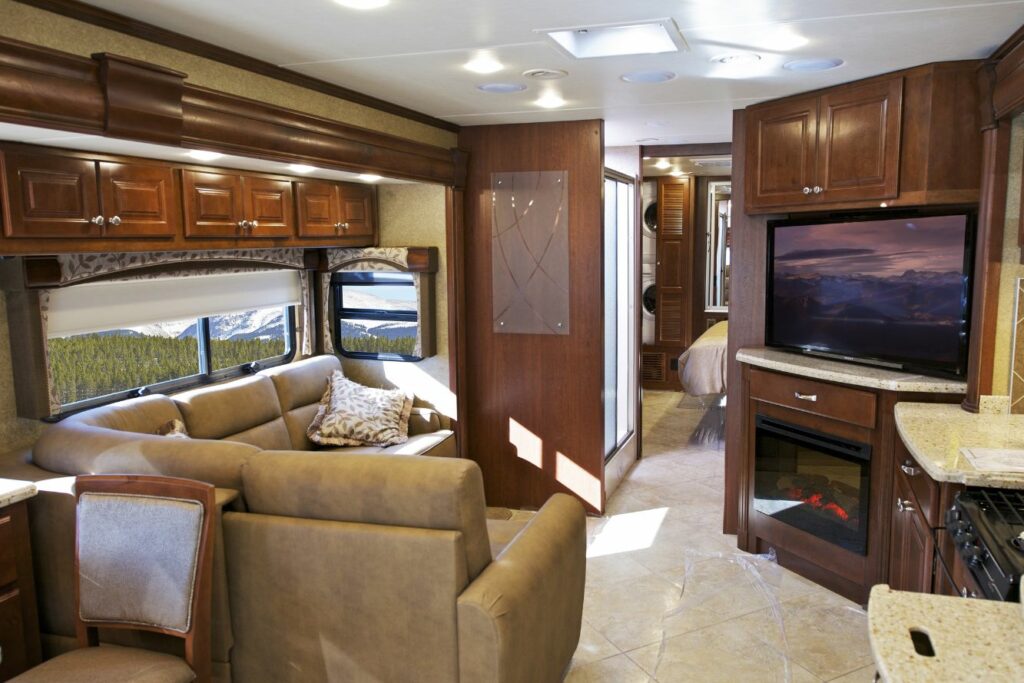
There are many different floor plans in the various RV types. Fifth wheel RVs have the most varied floor plans. With fifth wheels, you can find floor plans that include multiple bedrooms and bunk beds, a floor plan with a dedicated office, rear-living with a front bedroom, front-living with a rear bedroom, and more.
Travel trailers also offer a good deal of variety in floor plan types. Motorhomes and smaller campers will all have the same general floor plan due to the structure of the rig and the size. There will still be slight variations like dinette vs recliners or a stand-alone table, slide-outs or no slide-outs, etc.
The best way to get a feel for how different floor plans will work for you is to head to your local RV dealership or RV show and tour multiple RV types and floor plans.
Storage Space
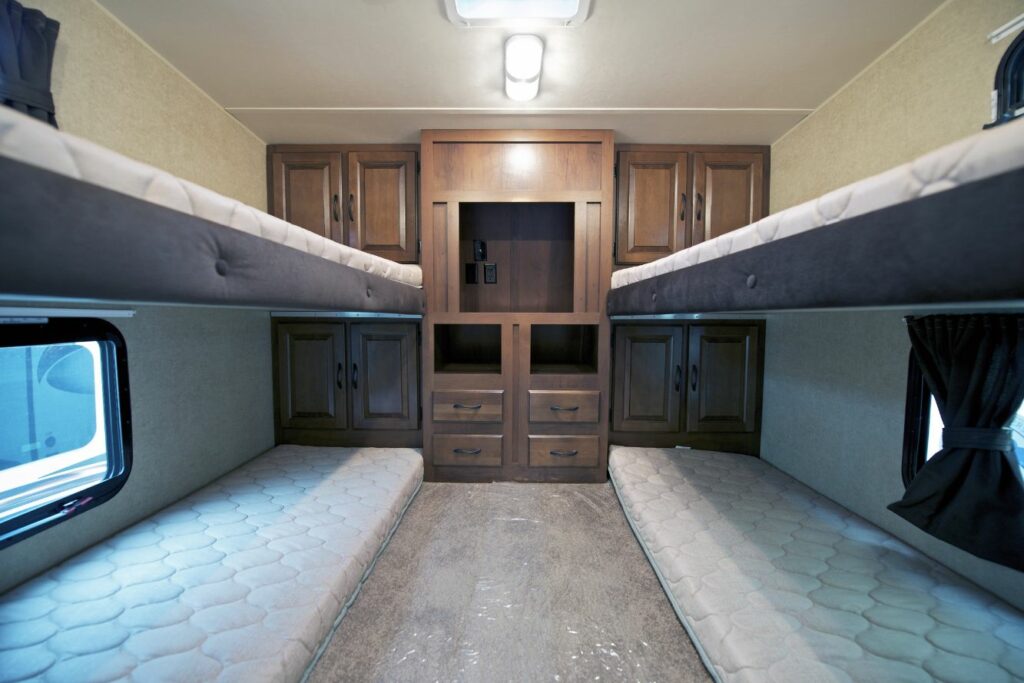
Most RVs are not made with full-time living in mind. Instead, the majority of RVs are made to be traveled and camped in for the short-term.
This means that many of them are lacking in the ample storage space you might be used to if you’re coming from a house or apartment.
There are a lot of things you need to consider storage for, including but not limited to:
- Clothes
- Kitchen items like dishes, appliances, and cookware
- Extra linens and blankets
- Books
- Toiletries
- Personal belongings
- Shoes
- Outdoor gear
This list could go on and on. Planning for RV life and downsizing will give you a better idea of how much stuff you will be bringing with you.
When looking at RVs, don’t forget to look at the amount of storage space. This will ensure you can bring everything you need and not have to worry about clutter.
Drivability / Towability / Weight
If you plan to live full-time in an RV while stationary at an RV park or campground, this consideration won’t matter as much. (Though the risks of being overweight won’t be as severe as they are if you’re driving, you do still have to consider the strain on your tires and other components for when it’s eventually time to move your RV.)
But if you plan on embarking on the full-time RV travel lifestyle, this is a huge consideration to factor in.
If looking at a motorhome, consider the drivability. Driving a large motorhome is always going to feel different than driving a car, and it will be something you will have to get used to. Just make sure that it’s not so large that you won’t ever feel comfortable driving it.
If you’re looking at a travel trailer or fifth wheel, there are a few more factors to consider. Aside from the overall length of the rig (which will impact driving comfort), the weight of the RV matters a lot.
If you already have the truck or vehicle you plan to tow with, you need to make sure the RV you choose has a GVWR that is below your maximum towing capacity to avoid damage to your vehicle.
For more on this subject, check out our article Truck Buyers Beware: Know Your Ratings for Safer Towing.
Camping Style
Last but certainly not least, your camping style will definitely affect the type of rig that will be best for you.
If you plan to live stationary in an RV park, then you should have no problem going for the biggest rig that suits your needs.
However, if you want to do a lot of camping in National Parks, you should be aware that many National Parks have RV length restrictions. Many parks limit the total RV length to 25 feet long due to the small campsites and narrow, winding roads.
While bigger may be more comfortable, it’s not always better. In addition to National Parks, some campgrounds and RV parks have length restrictions, too. Even parks that have longer sites tend to have fewer of them, which can impact your travels plans.
And if you plan to boondock most of the time, you should be aware that you will also be limited on the amount of boondocking sites you can venture to with a large rig.
This isn’t to say that it’s difficult to find campsites if you have a large RV – it’s still very possible and you can still find beautiful boondocking sites! However, you will be more limited than if you had a smaller rig.
Do you dream of becoming a full-time RVer? If so, check out our premier online course: Roadmap to Full-Time RVing!
Roadmap to Full-Time RVing covers everything you need to know to become a full-time RVer, from downsizing and buying the perfect RV to how to find campgrounds and navigate your first challenges on the road!
What’s The Best Kind of RV For Full-Time Living? Understanding RV Types
From large motorhomes to tiny travel trailers, each RV type has its own pros and cons when it comes to full-time RV living.
In this section, we’ll briefly touch on all the different types of RVs and list their pros and cons for the full-time RV lifestyle.
For a full deep-dive into this topic, check out our guide to the types of RVs here.
Drivable RVs / Motorhomes
Motorhomes are sorted into the Classes A, B, and C. Most motorhome classes have similar floor plans and layouts due to the fact that they have a cab for driving. There is some variation among motorhome floor plans, but generally, they are the most limited.
With a motorhome, you will need to tow a vehicle behind you if you want a separate vehicle for daily errands and local adventuring.
Class A
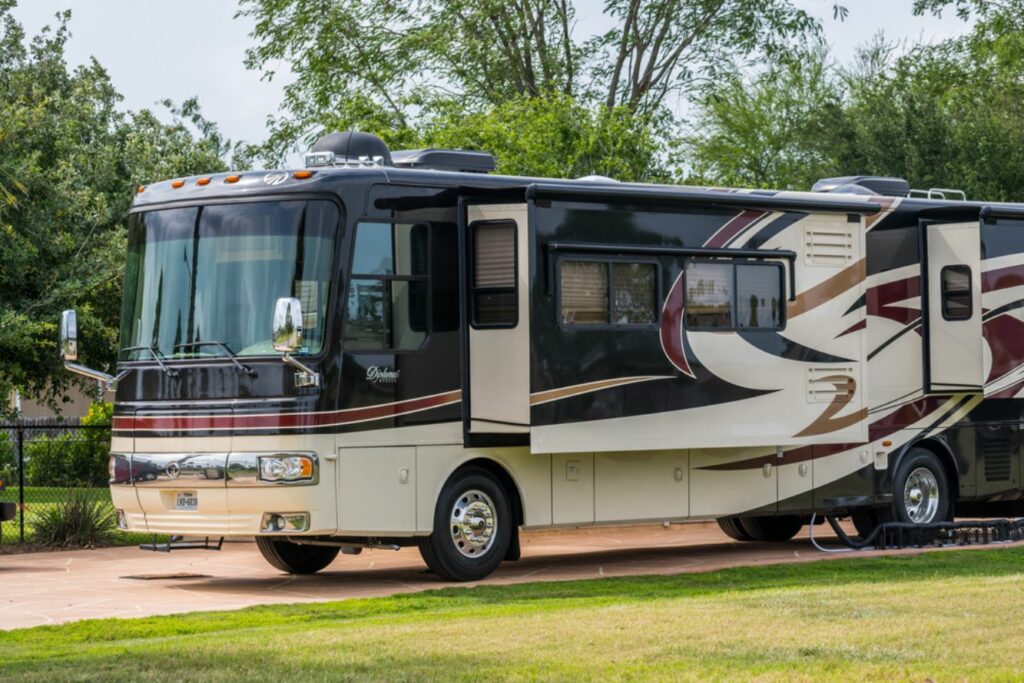
Class A motorhomes are the large, bus-like RVs with a flat front and can be powered by either diesel or gas engines.
Pros of Full-Time Living in Class A RVs:
- Decent amount of storage
- Has more creature comforts than other drivable RV classes
- Large windshield makes a great driving experience and campground view
- Driving and living areas are connected for easy access while traveling
Cons:
- Expensive
- Low MPG
- Tall height can be intimidating for some and requires careful trip planning
- Lack of variety in floor plans compared to towables
- Higher insurance costs than other RV classes
Class B
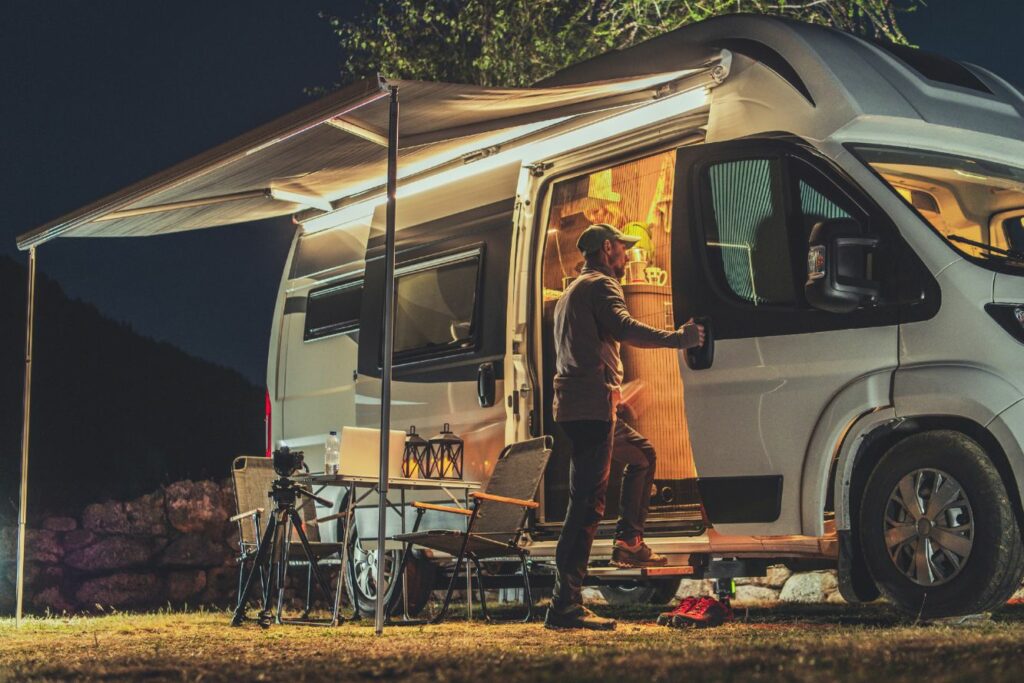
Class B motorhomes are RVs built onto van chassis like Mercedes, Dodge Promaster, and Ford Transit.
Pros of Full-Time Living in Class B RVs:
- Small and nimble, can take almost anywhere
- Better MPG than larger motorhomes
- Effective use of floor plan space
- Easiest motorhome to drive
Cons:
- Very little storage inside or outside
- Not suitable for families
- Expensive
Class C
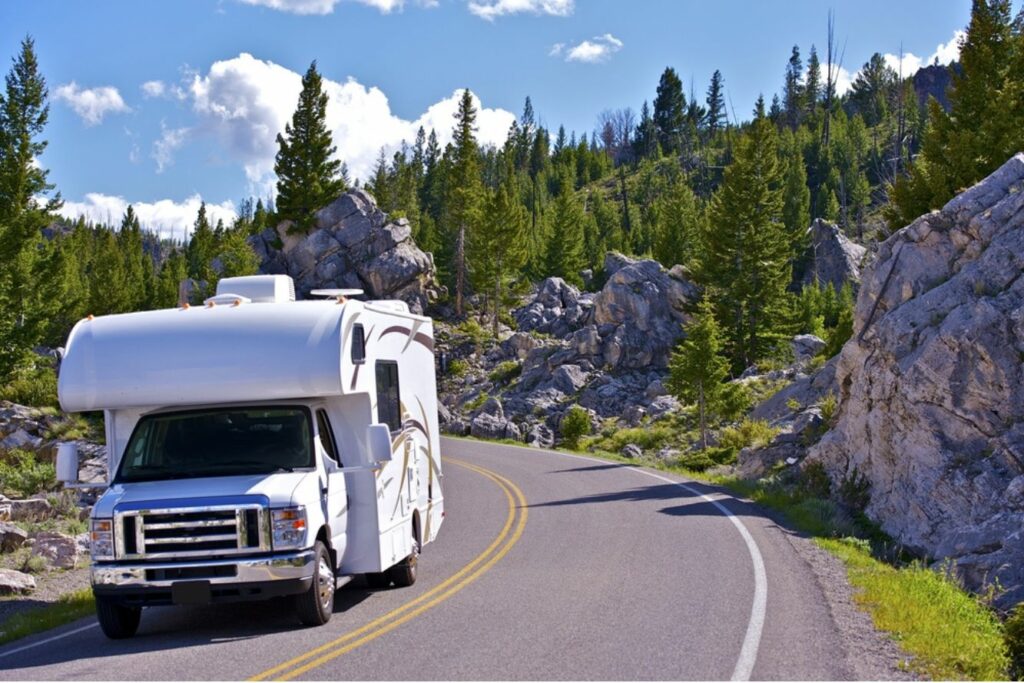
Class C RVs are built on a truck chassis and are easily distinguishable by the cab-over section that sits over the driving area.
Pros of Full-Time Living in Class C RVs:
- Moderate amount of storage space
- Feels like driving a truck
- More affordably priced than Class A or B motorhomes
- Some models are small and nimble enough to take many places
- Extra space above the cab – usually a bed or storage space
Cons:
- More expensive than towable RVs
- Lower MPG than Class B RVs
- Prone to leaks in cabover area
Towable RVs
Towable RVs are just what they sound like: RVs you can tow. Fifth wheels, travel trailers, truck campers, and more – there are a lot of towables to choose from.
With towable RVs, your engine and your vehicle are separated, which can be helpful if either your vehicle or your camper needs repairs.
Travel Trailers
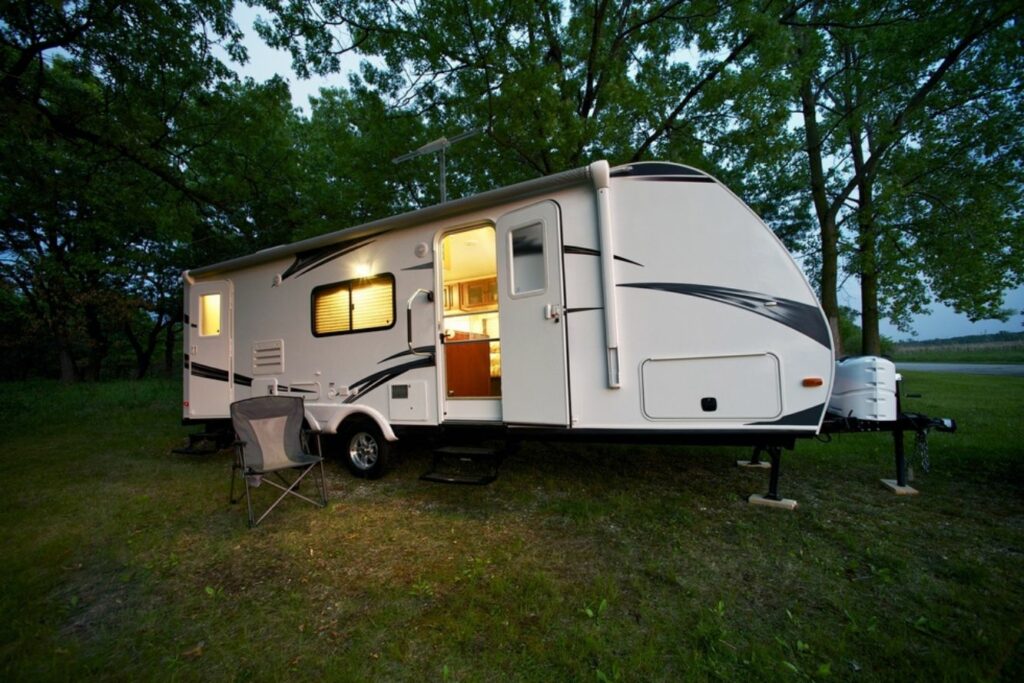
Travel trailers hook up to the bumper of a tow vehicle. These campers can be towed with any vehicle strong enough to pull them, and they range in size from under 19’ to up to 40’ long.
Pros of Full-Time Living in a Travel Trailer:
- Most affordable option
- Decent variety in floor plans and sizes
- Moderate storage space depending on size
Cons:
- Lack of exterior storage options
- Not as comfortable to tow compared to a fifth wheel
- Often less insulated than other RV types
Fifth Wheels
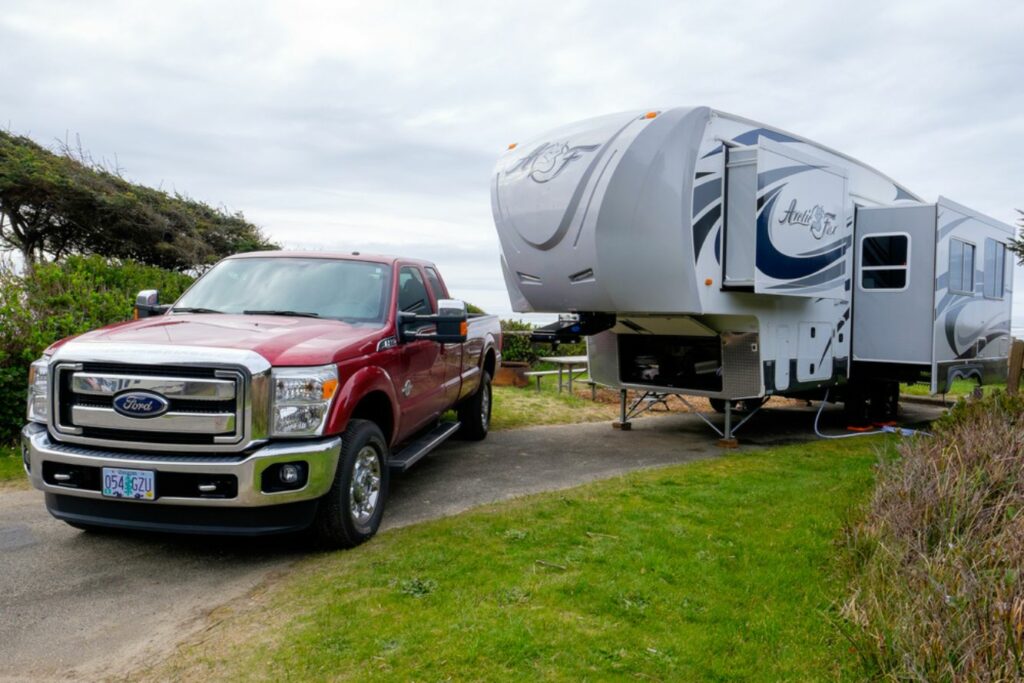
Fifth wheels are towable RVs that connect to a fifth wheel hitch in the bed of a truck. These are the largest types of towable RVs.
Pros of Full-Time Living in a Fifth Wheel:
- More variety of floor plans
- Variety of sizes, quality, and price point
- Most stable and comfortable towing experience
Cons:
- More expensive than travel trailers
- Typically requires a medium- to heavy-duty truck
- Tall in height, which can affect travel routes and available campsites
Destination Trailers
Destination trailers are towable RVs that are created with the intention of being parked in one place for a long period of time.
Pros of Full-Time Living in a Destination Trailer:
- Residential layout and options like full-sized bathrooms, lofts, etc
- Variety of floor plans
- Great for stationary full-time RV living
Cons:
- More expensive than other towable options
- Very heavy to tow
- Not meant to use for fast-paced traveling lifestyles
Understanding Full-Time RV Camping Styles
Now that we’ve covered the pros and cons of the different types of RVs, let’s cover different camping styles.
The way that you plan to full-time RV will be a major factor in considering the type of RV that’s best for full-time living for you.
Full-Time Stationary RVing vs Full-Time Traveling
Full-time stationary RV living is living in an RV full-time while parked at an RV park, resort, or on a piece of property with RV hookups.
Full-time stationary RV living is a great option for anyone looking to downsize, stay close to work and school, or just try a different style of living to save money.
Full-time RV traveling is a style of RVing where you are traveling full-time, although this doesn’t mean every day. Some full-time traveling RVers choose to stay a few weeks to a few months in one spot. The main difference from stationary RVers is that full-time traveling RVers aren’t permanently bound to one spot.
Campgrounds, Resorts, and RV Parks
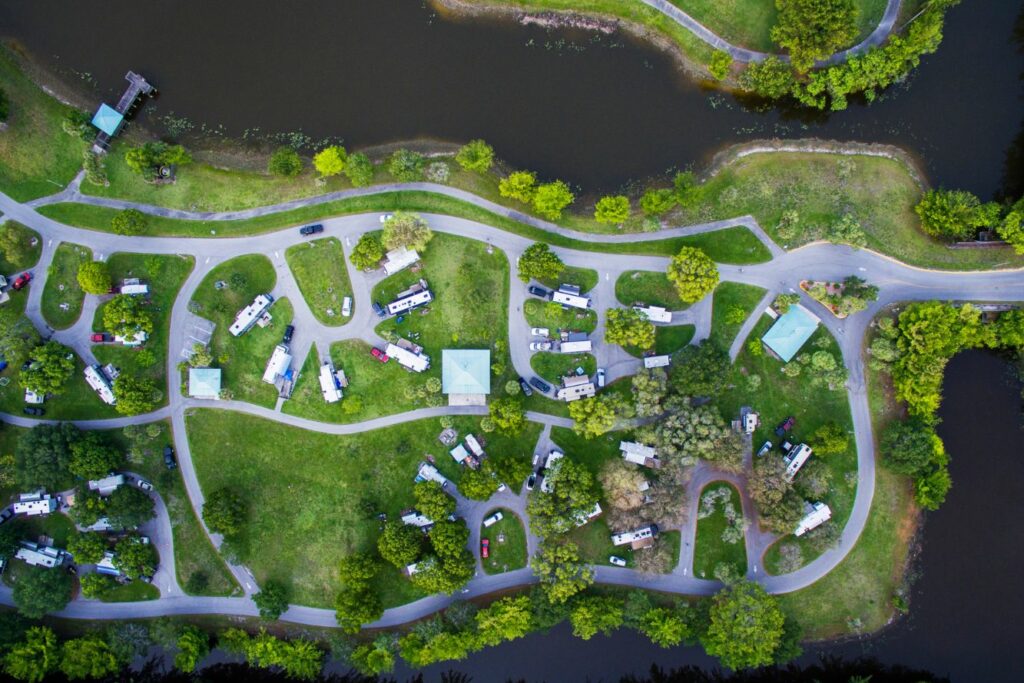
As a full-time traveling RVer, you will have several options available to you for camping.
Some travelers prefer to stay in nothing but high-end resorts. Others like the back-to-nature feeling from state parks. And others get by just fine in an RV park with minimal amenities.
Or, maybe you’d like to try a variety of campgrounds!
Aside from personal preference, the main factors that will affect how and where you stay in your RV will come down to budget, the size of your rig, and the age of your rig.
Some RV parks have length restrictions. Additionally, many resorts and some private campgrounds employ the “RV 10 Year Rule”, which is a rule that doesn’t allow RVs older than 10 years into the campground, depending on management and the RVs condition.
Boondocking
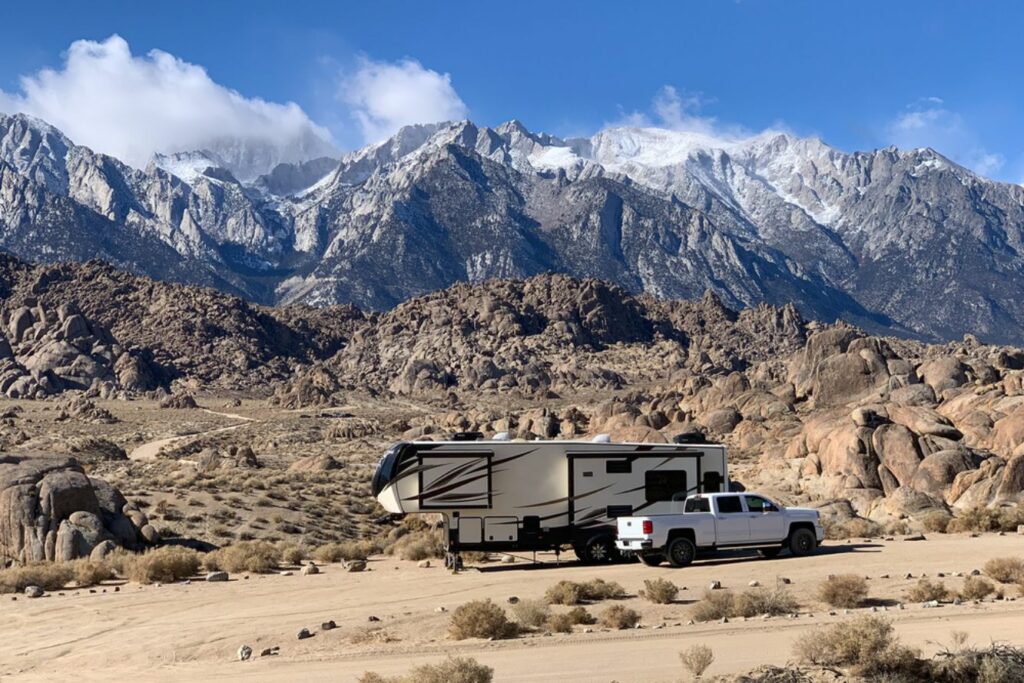
Boondocking is camping for free or low cost and typically done on public lands, like land operated by the Bureau of Land Management (BLM).
This is a style of camping with no electricity hookups and no sewer services or potable water, either. Just you and your RV!
If you want to spend a considerable amount of time boondocking, choosing an RV with large holding tanks for fresh and waste water will set you up for success. You may also want to think ahead to future installs of solar panels and other systems popular with boondockers, ensuring you have enough roof space and/or weight capacity.
How to Choose The Best RV For Full-Time Living For Your Specific Needs
With all of this information in mind, you are now more prepared to start narrowing down your choice for the best RV for full-time living for you. Here are some quick tips to help you get started.
- Make a list of your wants, needs, and nice-to-haves.
- Make sure you will have ample space for everyone coming along – motorhomes typically only have one private bedroom, but a fifth wheel can have up to 3!
- Head out to an RV show or dealer and tour various RV types, sizes, and floor plans.
- Rent your desired RV for a couple of days to camp and see how it feels.
- Decide what type of camping style you prefer to do.
Do you dream of becoming a full-time RVer? If so, check out our premier online course: Roadmap to Full-Time RVing!
Roadmap to Full-Time RVing covers everything you need to know to become a full-time RVer, from downsizing and buying the perfect RV to how to find campgrounds and navigate your first challenges on the road!
Wrapping Up The Best RV For Full-Time Living
Solving the “best RV for full-time living” question is no easy task. It’s highly individual, because every RVer and RVing family has different needs and wants.
RVing is truly for everyone – there are so many ways to do it, and so many types of RVs. It can fit every preference and every budget… But that also means that there are no one-size-fits-all answers to some of the hardest questions.
This part of the journey is yours alone, but after going through this post and making your lists and touring RVs, you should have a much better idea of what RV will work best for you.

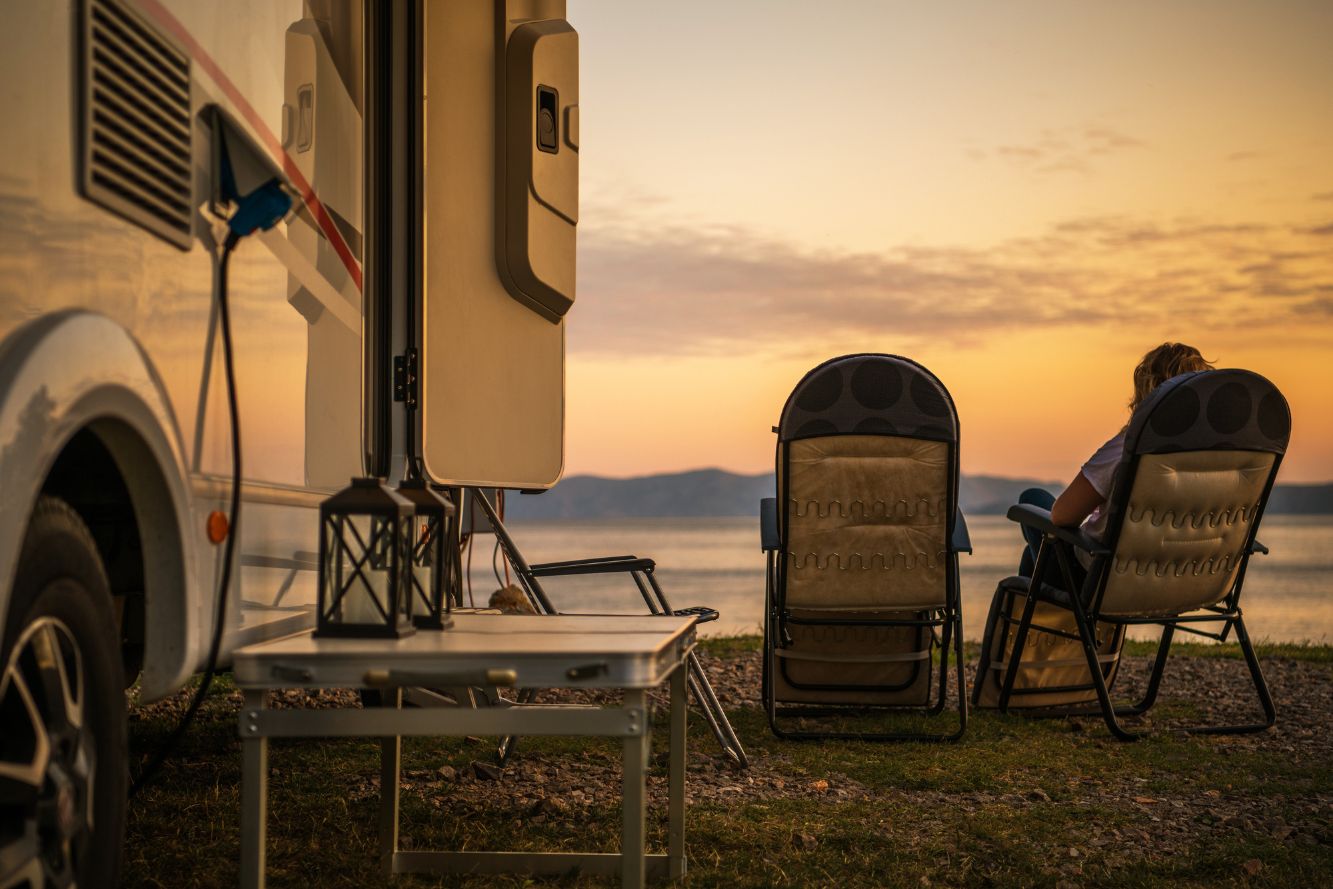
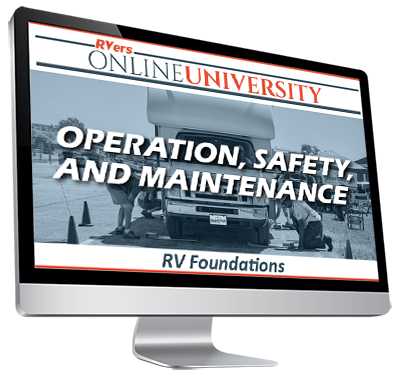



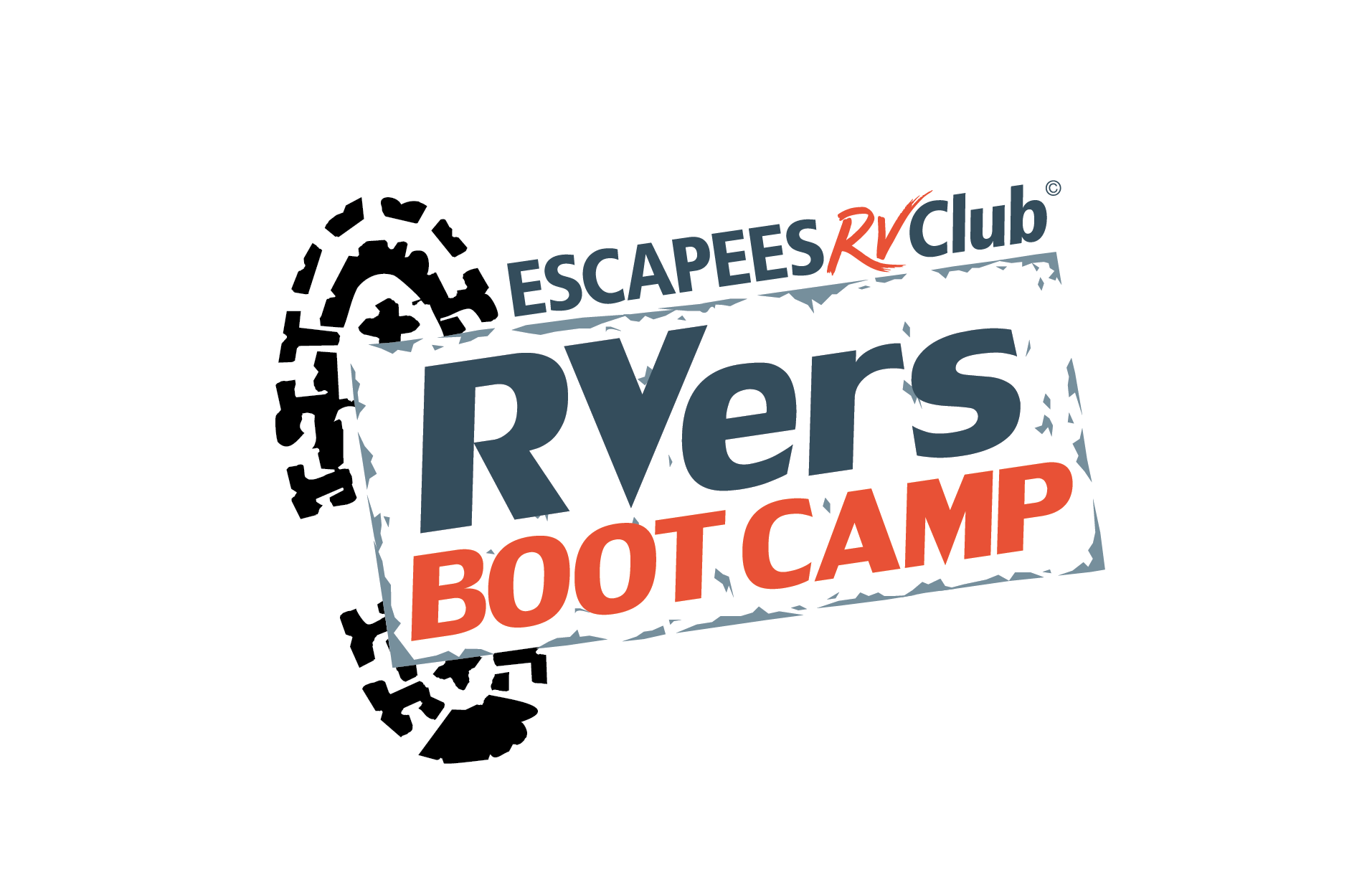


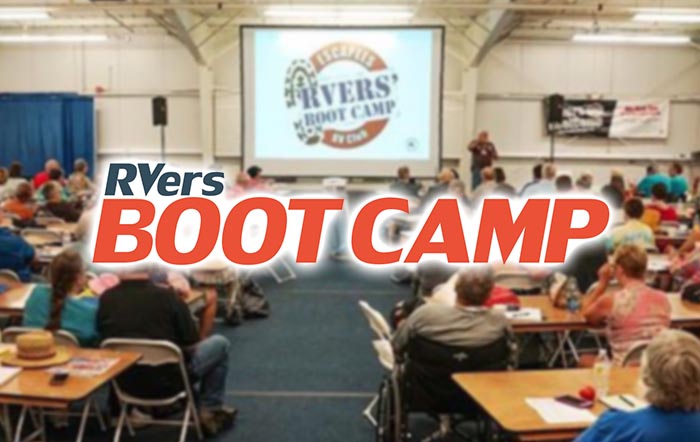
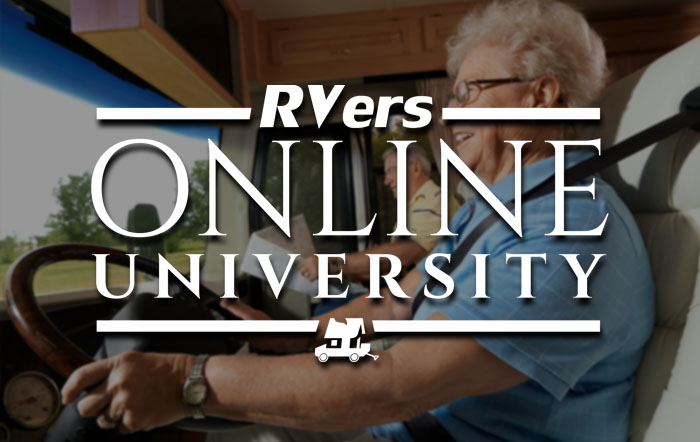

One Response
This is a great primer-type article for folks considering full-time RVing and what type of rig may meet their needs. It certainly is a highly individualized, personal choice issue!
Jeanne and I put in a lot of time and effort determining what type of rig might be best for us to live, remote work, and travel full-time in. That preparation and research, along with a good measure of luck, I’m sure, resulted in our first and only RV (30’ Class A, towing) being the perfect rolling home for us over the past five years! 😊